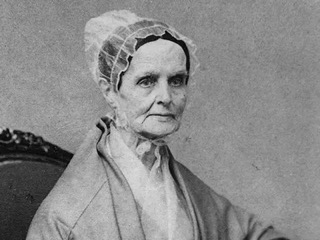
“I have no idea of submitting tamely to injustice inflicted either on me or on the slave. I will oppose it with all the moral powers with which I am endowed. I am no advocate of passivity.”
Lucretia Coffin Mott did a lot; of vindicating of women’s rights. Born one year after Mary Wollstonecraft’s radical A Vindication Of The Rights Of Woman was published, this Major Mommy of the women’s movement inspired and guided generations of feminists from Elizabeth Cady Stanton, to Lilly Ledbetter. Abolitionist, reformer, minister, organizer, wife of fifty years to a guy who sounded an awful lot like a real partner, and mother of six, Lucretia Mott was first and foremost a Quaker. She grew up on Nantucket Island, where the men went out to sea and the women did – well – everything. Lucretia helped her mom, who was very busy running the business, the house, raising the family – your basic nineteenth century multi-tasking Quaker woman. The peace loving spiritually guided religiously persecuted group was founded on the principles of equality and justice and did she ever practice what she preached. And she did actually preach. The Quakers or The Society of Friends as they were called were the only religious group to allow women preachers (see Anne Hutchinson). She was an ordained Quaker Minister at the age of twenty-eight, becoming America’s most beloved, respected and well-known advocate of abolition and women’s rights. She talked the talk and walked the walk, like not using any slavery-produced products (cotton cloth, and cane sugar) and her home was also a stop on Harriet Tubman’s Underground Railroad. She formed the Philadelphia Female Anti-Slavery Society after being told No Girls Allowed in The American Anti-Slavery Society. Elizabeth Cady Stanton (the first real Architect of The Women’s Movement) first heard her preach in 1840 when they were both on the same ship to London where they were to represent America at the World Anti-Slavery Convention. It was there that the two women, twenty years between them, bonded after being told – again – No Girls Allowed. This of course inspired America’s first Women’s Rights Convention eight years later (see Seneca Falls). Who knew that just saying no could be so motivating? In 1866, Mott became President of the American Equal Rights Association and spent the rest of her life peacefully fighting for equality.